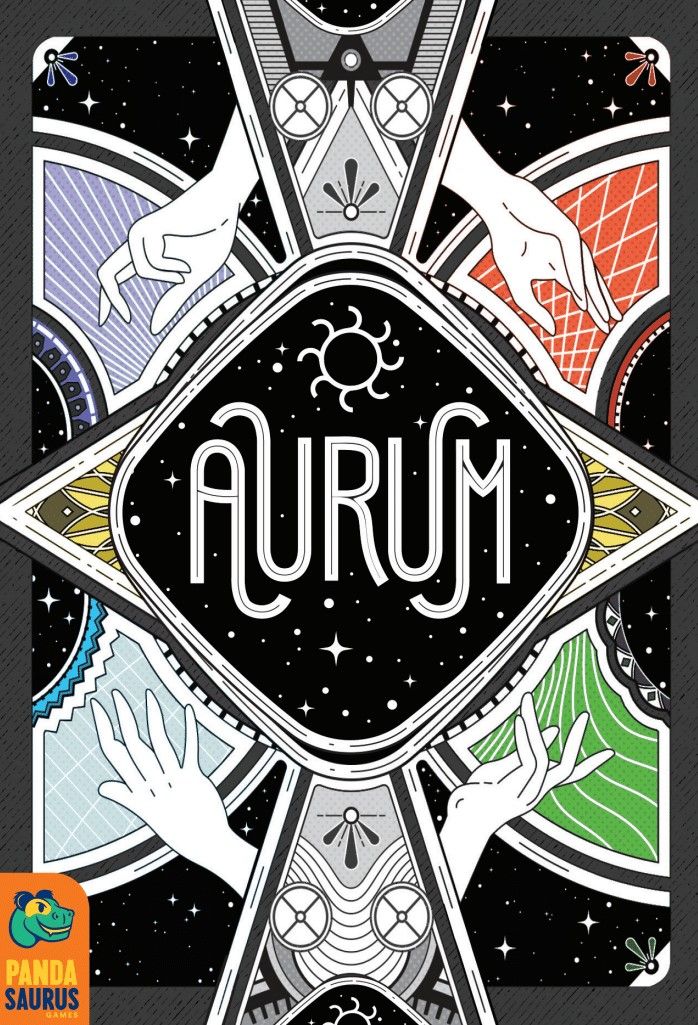If trick-taking is your thing, you’re spoiled for choice lately. You want full co-op? The Crew‘s got you. You want something mean because you like making your family swear at you? Get a game of Stick ‘Em going. You want a board too? Brian Boru fits the bill (review here). Heck, we’ve even got trick-takers dabbling in quantum physics in Cat In The Box. If none of those tickles your fancy, how about a new trick-taking game where you expressly have to not follow suit? Ah, got your interest now have I? Pandasaurus Games and designer Shreesh Bhat bring us Aurum, and it’s really rather good.
Alchemy
The story – like it matters – is that you and the other players are alchemists, and wouldn’t you just know it, you’ve discovered how to transmute base metals into gold. What a result! Between you, you’re trying to perfect the formula…
…skip-to-the-end, here’s a game.
The rules for Aurum are pretty simple, with a couple of little outliers to remember. You can lead a trick with any suit but gold. You must not play a card of any suit already in the trick. The highest value card wins the trick. Gold trumps all suits.

At the start of each round, you choose a card from your hand and play it face-up to make a bid. Your bid is how many tricks you expect to win. At any time you can play a gold card from your stash of gold cards to replace that bid with another, but that costs you a precious gold.
So far, so by-the-book, right? Gold cards are super-good. Not only do they trump all other suits (i.e. you can win a trick by playing a zero-value gold – nice), and not only do they let you swap your bid mid-game, but they’re also worth points at the end of a round. The kicker? The little thing which makes you want to play this game instead of another? The loser of a trick gets to claim a gold card from the market row matching the value of their losing card. Pretty devious, right?
The Miller Process
The Miller Process is used in gold refining to help it get as close as possible to 100% pure. I might sound smart knowing that, but in truth I looked it up just for a catchy heading for this section of the review. I wanted to emphasise how Aurum really feels like a distillation of the genre, a purified trick-taker. There have been so many variations on a theme that it feels almost fresh to prune the game back and to keep it feeling like a hundred-year-old traditional game.

It’s worth knowing that there are two versions of the game in the box. The three- and four-player games follow the same basic rules but differ slightly as the four-player is two teams of two playing as partners. Your bid is shared, so there’s some tactical play required to try to make sure you meet that bid. If you do manage to win exactly the same number of tricks as your bid, you get double that amount in points. Going over nets you your bid, but go under the bid and it’s a big fat goose egg for you – 0.
Balancing the number of tricks you’ve won against the number of gold cards you’ve got is the trick (pardon the pun). 0-value golds are worth nothing at the end of a round, but 7-8 cards are worth three points each. I’ve seen rounds comprehensively won when a player completely abandoned their bid and mopped up a stack of gold cards instead. There isn’t too much to keep track of in Aurum, but there’s plenty to keep your brain occupied.
Final thoughts
Aurum is my favourite card game at the moment. I love how simple the game is to play and to explain. It takes a couple of tricks for new players to understand why you want to lose some tricks, and more importantly, how to lose well. Anyone can lose, but losing and taking a 6-value gold at the same time? That’s the good stuff, right there. If you don’t like trick-taking games, there’s nothing here which is going to make you change your mind, but that’s one of its strengths. It’s unashamedly a trick-taking game with no gimmicks.
I’m a little bit in love with the artwork in Aurum. There isn’t much, of course, it’s a card game, but the illustrations are gorgeous. The hands depicted on each card have a different pose according to the suit’s element, and I really like the art nouveau meets tarot aesthetic used throughout. Making a card game look unique and not lose the instant legibility you need from it is a skill I really appreciate.
When Aurum releases in the near future here in the UK, you should be able to pick it up for £20 or less. Should you though, that’s the question. If you’re after a card game that’s a bit different to others in your collection, yes, it’s a great game. If you like trick-taking games especially, then it’s a must-buy as far as I’m concerned. The bidding, the winning-by-losing, and the quick, snappy games make it a total winner in my opinion.
Review copy kindly provided by Pandasaurus Games. Thoughts and opinions are my own.
Enjoying this article? Consider supporting me.

Aurum (2023)
Design: Shreesh Bhat
Publisher: Pandasaurus Games
Art: Stevo Torres
Players: 3-4
Playing time: 30-45 mins
Adam is a board game critic with over 15 years of experience in the hobby. A semi-regular contributor to Tabletop Gaming Magazine and other publications, he specialises in heavyweight Euro games, indie card games and transparency in board game media.



